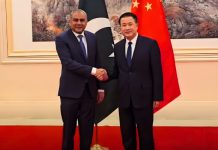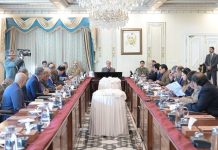DM Monitoring
DOHA: The tiny nation of Qatar expressed disappointment Sunday that nearly all of its Gulf neighbors snubbed invitations to attend the weekend peace signing ceremony between the U.S. and the Taliban.
Qatari Foreign Minister Mohammad bin Abdulrahman Al Thani told The Associated Press in an interview that the presence of Saudi, Bahraini and Emirati officials at Saturday’s event in Doha could have been an opportunity to signal unity amid a festering, nearly three-year-old crisis among the Gulf Cooperation Council members that has left Qatar isolated. “We were hopeful that our GCC brothers and neighbors would join us in yesterday’s ceremony,” al Thani said. “We invited them for the ceremony, but unfortunately they didn’t show up.”
Instead, he said their absence showed a continuing “absence of wisdom” among Qatar’s neighbors at a time when tensions in the Middle East, especially with Iran, are running high. Oman was the only GCC member to send its foreign minister.
“We were hoping to see them participating with us because we believe it is a cooperative approach between all the group of friends of Afghanistan,” he said, adding later: “We have, unfortunately, an absence of wisdom. In some countries in the region we want them to be more wise.”
Hosting and facilitating the crucial talks between the Taliban and the U.S. was a diplomatic coup for regionally isolated Qatar. It helps to strengthen the country’s strategic importance, not just as a major gas exporter and host to a sprawling U.S. military base, but also as a U.S. and European ally that can engage with a range of players, like the Taliban.
Saudi Arabia, for its part, welcomed the signing of the peace agreement. In its statement, it made no mention of Qatar’s role, only saying that the agreement helps to restore stability in Afghanistan and benefits the region’s security. American officials had hoped all the Gulf Arab states would participate in the ceremony at which the U.S. and the Taliban signed a peace deal aimed at ending 18 years of war. U.S. Secretary of State Mike Pompeo, who witnessed the signing of the deal, alluded to the Gulf crisis in a separate meeting with Qatari Emir Tamim bin Hamad Al Thani in Doha on Saturday.
The two discussed “the importance of a united GCC in standing against the Iranian regime’s destabilizing activity,” according to a U.S. readout of the meeting. Oman was the lone GCC member to send its foreign minister to the ceremony and Pompeo, who visited Muscat just two weeks ago, made a point of greeting Omani Foreign Minister Yusuf bin Alawi Abdullah at the event.




